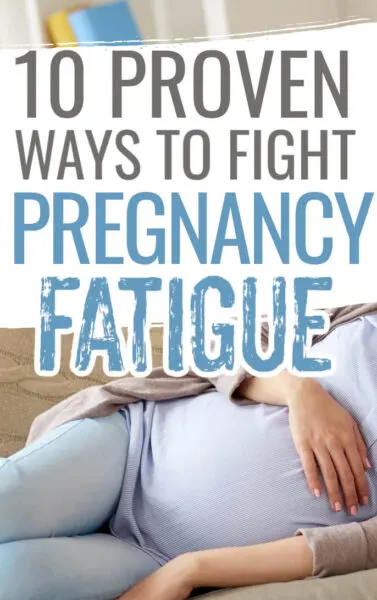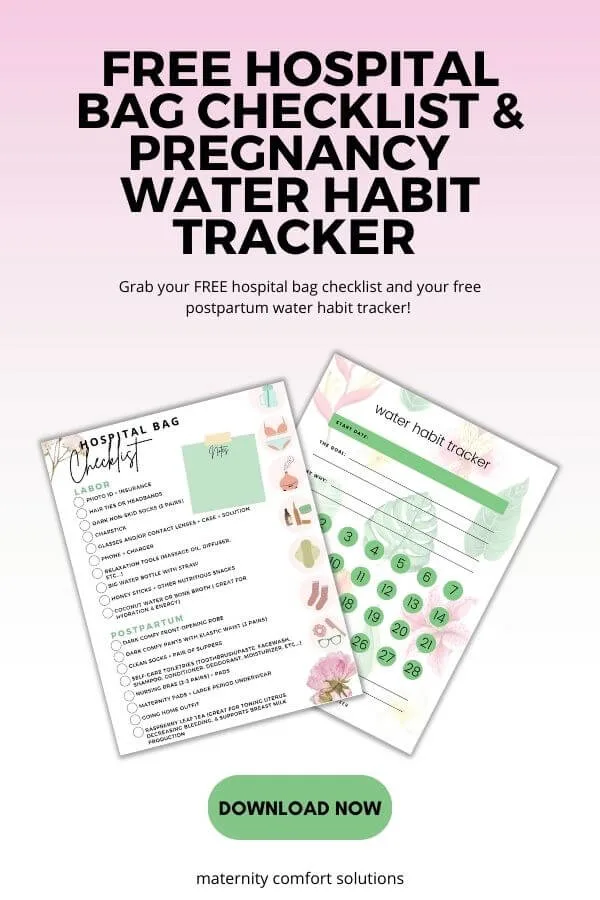Updated February 27, 2023
As an expectant mother, you may be feeling a little overwhelmed.
Your body is going through so many changes and you’re likely struggling with fatigue, exhaustion, or both.
It’s totally normal – pregnancy can put a strain on your energy levels!
Fortunately, there are proven remedies that help fight fatigue during pregnancy.
From trying new activities to taking advantage of the sleep you can get while pregnant – we’ll provide 10 easy strategies that work so you don’t have to guess which ones might help.

During the first trimester of pregnancy, fatigue is largely the result of the many physiologic changes occurring within your body.
In the third trimester, the nutrient and caloric requirements of carrying a full-grown baby are a tremendous burden to your metabolism which challenges your stamina to carry on the activities of daily living.
Having pregnancy fatigue is an indication that your body needs sleep AND time to recover from activities that were previously easy to accomplish.
It is not hard to see why fatigue during pregnancy can be a constant challenge.
LISTEN TO YOUR BODY and DO NOT push yourself.
Those around you (family and friends) may expect you to function at your pre-pregnancy level, always remember that you do not owe anyone an explanation.
Just do the best you can and realize that this is normal. You are creating another human being!
10 Tips To Fight Fatigue During Pregnancy:
1. Take naps when you feel tired.
Accept the fact that you need extra rest and pace your daily life accordingly.
Pregnancy is hard.
The fatigue you feel is real.
Don’t feel guilty for needing an afternoon nap.
Naps are a great way to reboot yourself and can really help you relieve your fatigue.
If you are having trouble sleeping, a great way to get more sleep is to use a pregnancy pillow.
If a certain task doesn’t need to be done, don’t do it. Pace yourself.
2. Sit down and elevate your legs frequently.
This helps in many ways, not the least of which is to help the swelling in your legs go down by returning fluid into your bloodstream.
Resting with your feet up can very often be enough to relieve your fatigue.
Try to do something that you enjoy and that you find relaxing. Maybe that’s reading a book or listening to your favorite music.
Your goal is to relax and rest.
3. Skip the coffee break and go rest instead.
Ironically, a coffee break is not a way to alleviate fatigue, other than for the short term.
Much like eating a heavy meal, only a few hours later you’ll be left feeling exhausted due to hormonal changes.
Take the opportunity to sit down and put your feet up for a few minutes.
4. Caffeine and other stimulants may increase fatigue
Fatigue is common during the first trimester.
Your first choice to fight it might be to grab a cup of coffee for an afternoon pick-me-up.
While that likely isn’t harmful to you or your baby, it may cause you to feel more fatigued within a couple of hours.
What I found worked for me was to switch to tea.
Tea doesn’t have as much caffeine, but I could drink more of it to stay within the recommended 200 milligrams of caffeine a day.
Tea didn’t give me a huge crash either, so my fatigue to energy levels felt better balanced.
5. Eat small, well-balanced meals several times a day.
Eat small “mini-meals” several times during the day.
A large meal will leave you feeling stuffed and seeking a nap.
Try to balance out your meals with enough carbs and protein, which will help keep your energy levels up.
Be careful of sugary snacks like candy bars or cookies.
They will immediately give you an energy pick-me-up but will make you feel even more tired within a few hours.
This is because your blood sugar will decrease as a result of insulin.
A trick I used to fight fatigue during pregnancy was to combine a carbohydrate and protein.
I’d have half of a sandwich. A piece of wheat or other whole-grain bread and cheese or turkey makes a great snack.
Plain greek yogurt and carrots, or greek yogurt and berries are also great choices.
Carbs and protein together will give you more energy than other simple sugar-filled choices.
6. Exercise regularly.
You’ll need to clear exercising with your healthcare provider.
But once given the all-clear, moderate exercise is safe during pregnancy.
Consider walking and yoga as exercise options.
These forms of exercise can help you relax.
Feeling anxious and stressed can add to your fatigue.
7. Stay Hydrated.
Drink plenty of water. Becoming dehydrated can increase your feelings of fatigue.
Watch the sugary drinks and flavored waters too.
They can give you a burst of energy, but can also increase your feeling of fatigue a few hours later.
Plain water can be boring! You can try infusing your water with fruit or herbs to get some variety. It is so easy to make.
If you are like me and don’t like the taste of plain water, infused water can be a great way to stay hydrated!
This is an amazing water infusion bottle:
Here are a few of my favorite flavored water recipes:
- 52 Fruit Water Ideas – Healthy Happy Smart
- 8 Infused Water Combos to Keep You Hydrated – Wholefully
- Cucumber Mint Infused Water – Five Heart Home
8. Don’t hesitate to ask family and friends for help.
You may not like to do so but this is an exception.
Reach out to family and friends; you’ll be surprised how many won’t mind helping out at all.
Ask your partner to help you out more.
Let other people cook, clean, and do childcare when you need a break.
You are growing a tiny human and that is exhausting work.
Tiredness and fatigue during pregnancy are normal.
Your friends and family WILL know you are experiencing fatigue during pregnancy. Ask for help!
9. Say “No” and don’t ever feel guilty about this.
Saying NO can be the hardest thing to do. Try to limit social commitments and errands if you can.
If it doesn’t have to be done, it can wait until you have more energy.
Cut back on your schedule and work demands if possible.
Be gentle and flexible with yourself.
Your energy level should perk up again during the second trimester.
10. Limit electronic screen time (cell phones, TVs).
Digital equipment is stimulating and can cause eye and body fatigue during pregnancy.
Spending too much time staring at a computer or phone screen can increase your fatigue levels.
If you work in front of a computer all day, remember to take breaks when you can.
Using electronic devices, like your phone or tablet late at night can make it difficult to fall asleep.
This is a significant contributor to fatigue during pregnancy.
Causes of fatigue during pregnancy
Pregnancy fatigue is a normal and expected symptom in the first trimester of pregnancy.
It can be caused by a number of different factors, including:
- Increased levels of estrogen and progesterone: These hormones are responsible for many changes in the body during pregnancy, including fatigue. Progesterone acts as a natural sedative, which can make you feel more tired than usual.
- Lower blood pressure: Blood pressure naturally decreases during pregnancy, which can lead to feeling fatigued.
- Growing a baby: Creating human life is an incredibly demanding process that takes lots of energy. This can cause you to feel exhausted and fatigued.
What does pregnancy fatigue feel like?
Pregnancy fatigue can feel like a combination of tiredness, sluggishness, exhaustion, and feeling overwhelmed.
You may feel tired even after getting a full night’s rest.
You may find yourself suddenly feeling out of breath after doing an activity that used to be easy for you, like climbing stairs or taking a walk.
You may also experience difficulty concentrating or feeling irritable.
I felt exhausted in the afternoon and I HAD to lie down for 30 minutes after I got home from work.
It felt like I couldn’t do or focus on one more thing.
But a 30-minute nap helped me feel recharged and less overwhelmed.
What can you do to reduce pregnancy fatigue?
One of the best ways to combat pregnancy fatigue is by getting plenty of rest.
Make sure that you’re aiming for seven to nine hours of sleep every night, and if you need a nap during the day, take one.
But if you are at work you can’t go an take a nap in the middle of the day what can you do to fight off the fatigue?
- Taking regular breaks throughout the day will also help you to rest and recharge.
- Staying active is important, but make sure to listen to your body when it tells you it’s time for a break.
- Eating a nutritious diet full of fruits, vegetables, and proteins can also help give you energy and reduce pregnancy fatigue.
- Drink more fluids. Dehydration during pregnancy can make your pregnancy fatigue worse.
- Take your allotted breaks and use that time to put your feet up
- And, don’t be afraid to ask for help from friends and family when you need it.
A little extra support can go a long way in helping you keep your energy levels up.
When should I be worried about fatigue in pregnancy?
If your fatigue is so severe that it’s interfering with your daily activities and you’re having difficulty sleeping, then you should talk to your doctor or midwife.
Other signs of concern include sudden weight loss, dizziness or fainting, or unusual paleness.
If any of these occur, it’s important to seek medical advice.
It’s also important to get regular checkups and follow a healthy lifestyle to ensure that you stay as healthy as possible throughout your pregnancy.
If you have any concerns about fatigue during pregnancy, don’t hesitate to talk to your doctor or midwife for further advice and support.
How can I stop feeling tired during pregnancy?
Your fatigue during pregnancy is a common symptom, and it’s important to find comfortable ways to manage it.
- Rest when possible
- get regular exercise (with your doctor’s approval)
- eat healthy foods,
- avoid caffeine
- try to reduce stress levels as much as possible.
There are some pregnancy comfort solutions that can help with fatigue during pregnancy, such as body pillows and maternity support belts.
These products can provide additional comfort to your growing belly and help ease the physical strain of carrying a baby.
Fatigue in early pregnancy: when does it start?
Fatigue or tiredness can be one of the early symptoms of pregnancy.
It can start between the 4th and 6th week of pregnancy.
Many women find feelings of fatigue in the afternoon to be one of their first pregnancy symptoms.
It usually starts to get better as you enter the second trimester and returns as you progress into the third trimester.
Other pregnancy articles you might find helpful:
- 9 Tips On How To Survive A Summer Pregnancy
- 9 Steps To Better Sleep During Pregnancy
- What Every Pregnant Woman Needs To Know About Anemia
- 7 Simple Ways To Cope With Stress During Pregnancy
Tiredness During Pregnancy
Courtesy of Ovum Parents
Always remind yourself that feeling to have to fight fatigue during pregnancy is normal.
Your body is adapting to the increased nutritional needs, hormonal changes, and physical demands of pregnancy.
Hopefully, these simple-to-follow suggestions will help you manage your fatigue during pregnancy.






